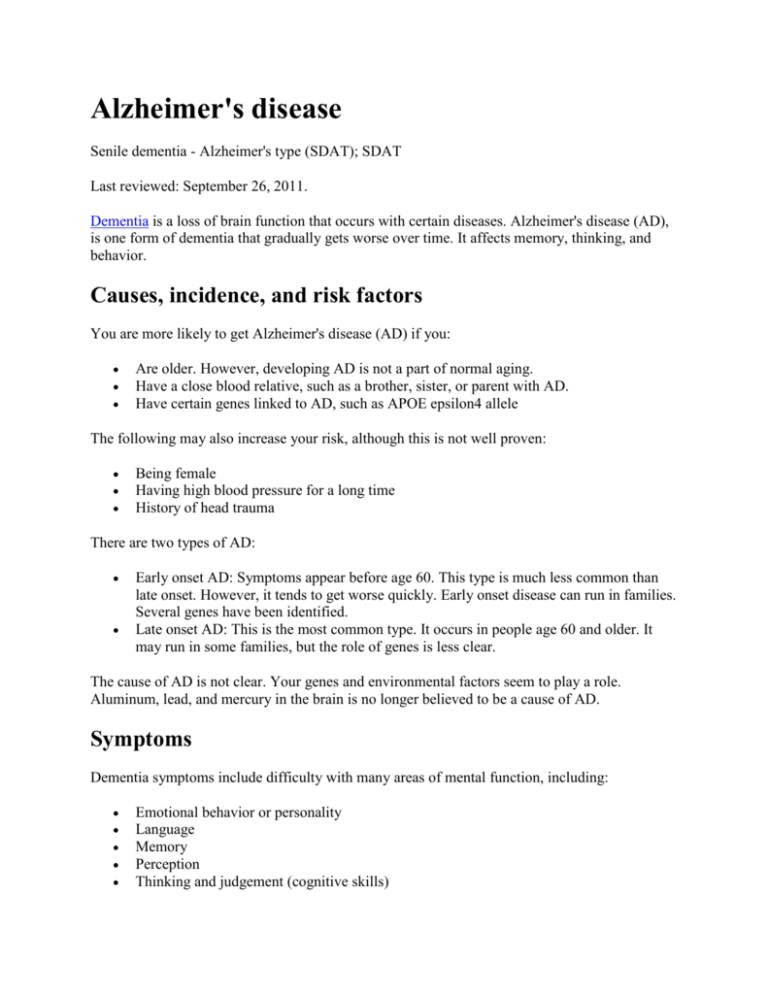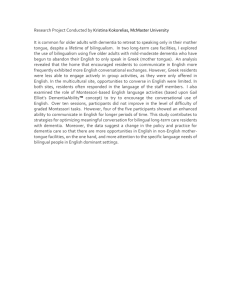You are more likely to get Alzheimer`s disease (AD) if
advertisement

Alzheimer's disease Senile dementia - Alzheimer's type (SDAT); SDAT Last reviewed: September 26, 2011. Dementia is a loss of brain function that occurs with certain diseases. Alzheimer's disease (AD), is one form of dementia that gradually gets worse over time. It affects memory, thinking, and behavior. Causes, incidence, and risk factors You are more likely to get Alzheimer's disease (AD) if you: Are older. However, developing AD is not a part of normal aging. Have a close blood relative, such as a brother, sister, or parent with AD. Have certain genes linked to AD, such as APOE epsilon4 allele The following may also increase your risk, although this is not well proven: Being female Having high blood pressure for a long time History of head trauma There are two types of AD: Early onset AD: Symptoms appear before age 60. This type is much less common than late onset. However, it tends to get worse quickly. Early onset disease can run in families. Several genes have been identified. Late onset AD: This is the most common type. It occurs in people age 60 and older. It may run in some families, but the role of genes is less clear. The cause of AD is not clear. Your genes and environmental factors seem to play a role. Aluminum, lead, and mercury in the brain is no longer believed to be a cause of AD. Symptoms Dementia symptoms include difficulty with many areas of mental function, including: Emotional behavior or personality Language Memory Perception Thinking and judgement (cognitive skills) Dementia usually first appears as forgetfulness. Mild cognitive impairment is the stage between normal forgetfulness due to aging, and the development of AD. People with MCI have mild problems with thinking and memory that do not interfere with everyday activities. They are often aware of the forgetfulness. Not everyone with MCI develops AD. Symptoms of MCI include: Difficulty performing more than one task at a time Difficulty solving problems Forgetting recent events or conversations Taking longer to perform more difficult activities The early symptoms of AD can include: Difficulty performing tasks that take some thought, but used to come easily, such as balancing a checkbook, playing complex games (such as bridge), and learning new information or routines Getting lost on familiar routes Language problems, such as trouble finding the name of familiar objects Losing interest in things previously enjoyed, flat mood Misplacing items Personality changes and loss of social skills As the AD becomes worse, symptoms are more obvious and interfere with your ability to take care of yourself. Symptoms can include: Change in sleep patterns, often waking up at night Delusions, depression, agitation Difficulty doing basic tasks, such as preparing meals, choosing proper clothing, and driving Difficulty reading or writing Forgetting details about current events Forgetting events in your own life history, losing awareness of who you are Hallucinations, arguments, striking out, and violent behavior Poor judgment and loss of ability to recognize danger Using the wrong word, mispronouncing words, speaking in confusing sentences Withdrawing from social contact People with severe AD can no longer: Understand language Recognize family members Perform basic activities of daily living, such as eating, dressing, and bathing Other symptoms that may occur with AD: Incontinence Swallowing problems Signs and tests A skilled health care provider can often diagnose AD disease with the following steps: Complete physical exam, including neurological exam Asking questions about your medical history and symptoms A mental status examination A diagnosis of AD is made when certain symptoms are present, and by making sure other causes of dementia are not present. Tests may be done to rule out other possible causes of dementia, including: Anemia Brain tumor Chronic infection Intoxication from medication Severe depression Stroke Thyroid disease Vitamin deficiency Computed tomography (CT) or magnetic resonance imaging (MRI) of the brain may be done to look for other causes of dementia, such as a brain tumor or stroke. In the early stages of dementia, brain image scans may be normal. In later stages, an MRI may show a decrease in the size of different areas of the brain. While the scans do not confirm the diagnosis of AD, they do exclude other causes of dementia (such as stroke and tumor). However, the only way to know for certain that someone has AD is to examine a sample of their brain tissue after death. The following changes are more common in the brain tissue of people with AD: "Neurofibrillary tangles" (twisted fragments of protein within nerve cells that clog up the cell) "Neuritic plaques" (abnormal clusters of dead and dying nerve cells, other brain cells, and protein) "Senile plaques" (areas where products of dying nerve cells have accumulated around protein). Treatment There is no cure for AD. The goals of treatment are: Slow the progression of the disease (although this is difficult to do) Manage symptoms, such as behavior problems, confusion, and sleep problems Change your home environment so you can better perform daily activities Support family members and other caregivers DRUG TREATMENT Medicines are used to help slow down the rate at which symptoms become worse. The benefit from these drugs is usually small. You and your family may not notice much of a change. Before using these medicines, ask the doctor or nurse: What are the potential side effects? Is the medicine worth the risk? When is the best time, if any, to use these medicines? Medicines for AD include: Donepezil (Aricept), rivastigmine (Exelon), and galantamine (Razadyne, formerly called Reminyl). Side effects include stomach upset, diarrhea, vomiting, muscle cramps, and fatigue. Memantine (Namenda). Possible side effects include agitation or anxiety. Other medicines may be needed to control aggressive, agitated, or dangerous behaviors. Examples include haloperidol, risperidone, and quetiapine. These are usually given in very low doses due to the risk of side effects including an increased risk of death. It may be necessary to stop any medications that make confusion worse. Such medicines may include painkillers, cimetidine, central nervous system depressants, antihistamines, sleeping pills, and others. Never change or stop taking any medicines without first talking to your doctor. SUPPLEMENTS Some people believe certain vitamins and herbs may help prevent or slowdown AD. There is no strong evidence that Folate (vitamin B6), vitamin B12, and vitamin E prevent AD or slows the disease once it occurs. High-quality studies have not shown that ginkgo biloba lowers the chance of developing dementia. DO NOT use ginkgo if you take blood-thinning medications like warfarin (Coumadin) or a class of antidepressants called monoamine oxidase inhibitors (MAOIs). If you are considering any drugs or supplements, you should talk to your doctor first. Remember that herbs and supplements available over the counter are NOT regulated by the FDA.









